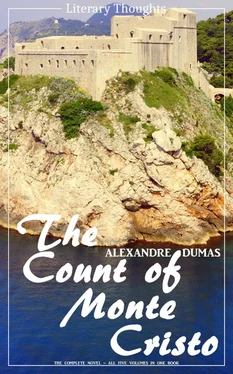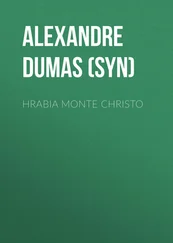"Who and what are you?" demanded Villefort, turning over a pile of papers, containing information relative to the prisoner, that a police agent had given to him on his entry, and that, already, in an hour's time, had swelled to voluminous proportions, thanks to the corrupt espionage of which "the accused" is always made the victim.
"My name is Edmond Dantes," replied the young man calmly; "I am mate of the Pharaon, belonging to Messrs. Morrel & Son."
"Your age?" continued Villefort.
"Nineteen," returned Dantes.
"What were you doing at the moment you were arrested?"
"I was at the festival of my marriage, monsieur," said the young man, his voice slightly tremulous, so great was the contrast between that happy moment and the painful ceremony he was now undergoing; so great was the contrast between the sombre aspect of M. de Villefort and the radiant face of Mercedes.
"You were at the festival of your marriage?" said the deputy, shuddering in spite of himself.
"Yes, monsieur; I am on the point of marrying a young girl I have been attached to for three years." Villefort, impassive as he was, was struck with this coincidence; and the tremulous voice of Dantes, surprised in the midst of his happiness, struck a sympathetic chord in his own bosom – he also was on the point of being married, and he was summoned from his own happiness to destroy that of another. "This philosophic reflection," thought he, "will make a great sensation at M. de Saint-Meran's;" and he arranged mentally, while Dantes awaited further questions, the antithesis by which orators often create a reputation for eloquence. When this speech was arranged, Villefort turned to Dantes.
"Go on, sir," said he.
"What would you have me say?"
"Give all the information in your power."
"Tell me on which point you desire information, and I will tell all I know; only," added he, with a smile, "I warn you I know very little."
"Have you served under the usurper?"
"I was about to be mustered into the Royal Marines when he fell."
"It is reported your political opinions are extreme," said Villefort, who had never heard anything of the kind, but was not sorry to make this inquiry, as if it were an accusation.
"My political opinions!" replied Dantes. "Alas, sir, I never had any opinions. I am hardly nineteen; I know nothing; I have no part to play. If I obtain the situation I desire, I shall owe it to M. Morrel. Thus all my opinions – I will not say public, but private – are confined to these three sentiments, – I love my father, I respect M. Morrel, and I adore Mercedes. This, sir, is all I can tell you, and you see how uninteresting it is." As Dantes spoke, Villefort gazed at his ingenuous and open countenance, and recollected the words of Renee, who, without knowing who the culprit was, had besought his indulgence for him. With the deputy's knowledge of crime and criminals, every word the young man uttered convinced him more and more of his innocence. This lad, for he was scarcely a man, – simple, natural, eloquent with that eloquence of the heart never found when sought for; full of affection for everybody, because he was happy, and because happiness renders even the wicked good – extended his affection even to his judge, spite of Villefort's severe look and stern accent. Dantes seemed full of kindness.
"Pardieu," said Villefort, "he is a noble fellow. I hope I shall gain Renee's favor easily by obeying the first command she ever imposed on me. I shall have at least a pressure of the hand in public, and a sweet kiss in private." Full of this idea, Villefort's face became so joyous, that when he turned to Dantes, the latter, who had watched the change on his physiognomy, was smiling also.
"Sir," said Villefort, "have you any enemies, at least, that you know."
"I have enemies?" replied Dantes; "my position is not sufficiently elevated for that. As for my disposition, that is, perhaps, somewhat too hasty; but I have striven to repress it. I have had ten or twelve sailors under me, and if you question them, they will tell you that they love and respect me, not as a father, for I am too young, but as an elder brother."
"But you may have excited jealousy. You are about to become captain at nineteen – an elevated post; you are about to marry a pretty girl, who loves you; and these two pieces of good fortune may have excited the envy of some one."
"You are right; you know men better than I do, and what you say may possibly be the case, I confess; but if such persons are among my acquaintances I prefer not to know it, because then I should be forced to hate them."
"You are wrong; you should always strive to see clearly around you. You seem a worthy young man; I will depart from the strict line of my duty to aid you in discovering the author of this accusation. Here is the paper; do you know the writing?" As he spoke, Villefort drew the letter from his pocket, and presented it to Dantes. Dantes read it. A cloud passed over his brow as he said, –
"No, monsieur, I do not know the writing, and yet it is tolerably plain. Whoever did it writes well. I am very fortunate," added he, looking gratefully at Villefort, "to be examined by such a man as you; for this envious person is a real enemy." And by the rapid glance that the young man's eyes shot forth, Villefort saw how much energy lay hid beneath this mildness.
"Now," said the deputy, "answer me frankly, not as a prisoner to a judge, but as one man to another who takes an interest in him, what truth is there in the accusation contained in this anonymous letter?" And Villefort threw disdainfully on his desk the letter Dantes had just given back to him.
"None at all. I will tell you the real facts. I swear by my honor as a sailor, by my love for Mercedes, by the life of my father" –
"Speak, monsieur," said Villefort. Then, internally, "If Renee could see me, I hope she would be satisfied, and would no longer call me a decapitator."
"Well, when we quitted Naples, Captain Leclere was attacked with a brain fever. As we had no doctor on board, and he was so anxious to arrive at Elba, that he would not touch at any other port, his disorder rose to such a height, that at the end of the third day, feeling he was dying, he called me to him. 'My dear Dantes,' said he, 'swear to perform what I am going to tell you, for it is a matter of the deepest importance.'
"'I swear, captain,' replied I.
"'Well, as after my death the command devolves on you as mate, assume the command, and bear up for the Island of Elba, disembark at Porto-Ferrajo, ask for the grand-marshal, give him this letter – perhaps they will give you another letter, and charge you with a commission. You will accomplish what I was to have done, and derive all the honor and profit from it.'
"'I will do it, captain; but perhaps I shall not be admitted to the grand marshal's presence as easily as you expect?'
"'Here is a ring that will obtain audience of him, and remove every difficulty,' said the captain. At these words he gave me a ring. It was time – two hours after he was delirious; the next day he died."
"And what did you do then?"
"What I ought to have done, and what every one would have done in my place. Everywhere the last requests of a dying man are sacred; but with a sailor the last requests of his superior are commands. I sailed for the Island of Elba, where I arrived the next day; I ordered everybody to remain on board, and went on shore alone. As I had expected, I found some difficulty in obtaining access to the grand-marshal; but I sent the ring I had received from the captain to him, and was instantly admitted. He questioned me concerning Captain Leclere's death; and, as the latter had told me, gave me a letter to carry on to a person in Paris. I undertook it because it was what my captain had bade me do. I landed here, regulated the affairs of the vessel, and hastened to visit my affianced bride, whom I found more lovely than ever. Thanks to M. Morrel, all the forms were got over; in a word I was, as I told you, at my marriage-feast; and I should have been married in an hour, and to-morrow I intended to start for Paris, had I not been arrested on this charge which you as well as I now see to be unjust."
Читать дальше












